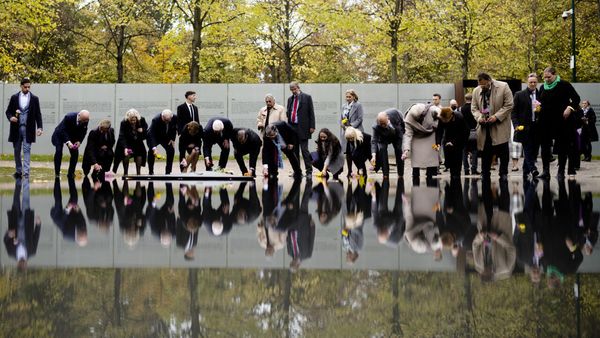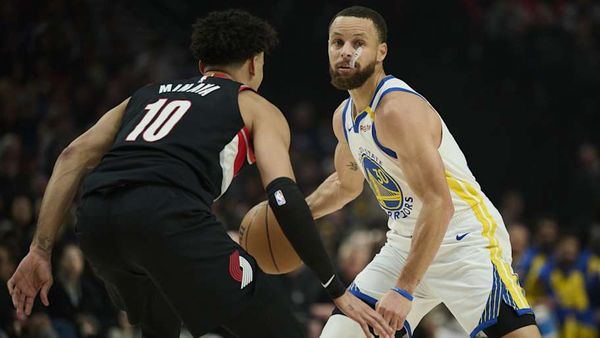The story of Duke volleyball player Rachel Richardson is a classic rush to judgment that should — but won't — have severe consequences for all of those who were way too willing to jump in and join an angry mob before they knew all the facts of the case. It is a tragedy only in that almost nobody that attacked BYU and its students cared enough about the facts to take a step back and be more measured in their response.
I am sure you heard the story but in case you didn't, Richardson and her Duke teammates played at BYU. Richardson is one of several Black players on Duke's team and, according to the story as told by her Godmother, Lesa Pamplin, on Twitter the next day, she was called a distinct racial slur several times when she served by someone in the crowd.
Naturally, this set off alarms in media and academia alike and all of the usual suspects came out of the woodwork to condemn BYU and start a conversation about white privilege and racism in college sports.
BYU — a predominantly white, conservative school in Utah that is affiliated with the Church of the Latter Day Saints — immediately apologized and a fan who was thrown out of the arena that night was banned because the backlash was immediate and harsh. The school administrators had no facts and hadn't done an investigation, but they understood how sensitive these issues are these days and got out ahead of some of the criticisms by issuing an initial statement and promising to investigate.
Richardson was then held up as some sort of hero and hailed for her courage. She even went on ESPN and did an interview with Holly Rowe, recounting how difficult the incident was to endure and even doubled down on the fact that someone called her a "really strong racial slur" at least twice.
It all made for a way-too-easy "look how racist America is" tale as we had the predominantly white, religiously affiliated, affluent, conservative students ganging up on an opposing Black female athlete in an ugly and racist incident.
It was shocking when I first heard the story, no doubt. As a Black man who has three Black children who all participated in athletics, it disgusted me and made me angry but also sad. I needed to know more before I reacted, though, and that is because as a journalist it isn't my job to be shocked, to be an activist or to jump out with my own personal beliefs and biases. I have to gather all of the facts of the story and make sure they all add up.
That used to be the practice of all journalists, but apparently that is no longer the case — especially in situations like this one.
After just a little bit of investigating, I grew suspicious of the story and began to think it was most likely just that — a story. It didn't matter what the facts were, though, as a faction of media and academia had already blown it up into another discussion about white privilege and racism in America. Once the ball got rolling down that hill, there was no stopping it. There is still no stopping it, even though the incident has been thoroughly investigated by BYU, local police and anyone else that actually cared about getting to the bottom of it.
BYU issued its statement Friday morning. Here are the key paragraphs:
"As part of our commitment to take any claims of racism seriously, BYU has completed its investigation into the allegation that racial heckling and slurs took place at the Duke vs. BYU women's volleyball match on August 26. We reviewed all available video and audio recordings, including security footage and raw footage from all camera angles taken by BYUtv of the match, with broadcasting audio removed (to ensure that the noise from the stands could be heard more clearly). We also reached out to more than 50 individuals who attended the event: Duke athletic department personnel and student-athletes, BYU athletic department personnel and student-athletes, event security and management and fans who were in the arena that evening, including many of the fans in the on-court student section.
From our extensive review, we have not found any evidence to corroborate the allegation that fans engaged in racial heckling or uttered racial slurs at the event. As we stated earlier, we would not tolerate any conduct that would make a student-athlete feel unsafe. That is the reason for our immediate response and our thorough investigation."
The school also lifted the ban from the fan who was alleged to be involved in this because an investigation showed he wasn't thrown out for using racial slurs and didn't use racial slurs. Surely, if someone used slurs multiple times, in a crowd full of people with multiple cameras and videos and security guards around, somebody would have heard it, right?
But again, there isn't a single person who was in that arena full to the brim of thousands of fans, athletes, administrators, coaches, police, security guards, officials, vendors and statisticians who could corroborate the story.
Not one. Not a single one.
Those are facts — fully vetted and investigated facts. Every single media member and media outlet that attacked BYU owes the school an apology. If I were BYU, I would collect all of the receipts and hire a lawyer who specializes in defamation cases. BYU deserves a lot of credit for how they handled this whole mess and for taking their time and doing a thorough investigation to get to the truth.
Dawn Staley, South Carolina's incredible women's basketball coach, also got caught up in this and canceled a home-and-home series with BYU because of this incident. She was also hailed as some sort of courageous leader for doing that, even though canceling a home-and-home with BYU benefits her program because that was a "nothing to gain, everything to lose" kind of series for her team. I mean, going to Provo, Utah, is not something that the No. 1 women's program in the country needs or wants to do.
Staley should also apologize to BYU for rushing to judgment and should reinstate the series. That would be courageous. That would be an act of a role model, and that would be the right thing to do.
Duke should also apologize to BYU for some of the harsh statements it made in the aftermath of it all. And the number of media outlets — CNN, MSNBC, ESPN, just about every major newspaper, USA Today and everyone else who raked BYU over the coals before the actual facts of this incident came out — should get involved, too.
Duke athletic director Nina King could have been a leader by praising BYU for the investigation and expressing disappointment in the way the school was portrayed. Instead, she issued a nonsensical, meaningless statement about how Duke stands by its athletes and their integrity. The irony of this is that Duke was once caught up in one of the greatest examples of one of these kinds of hoaxes history with its lacrosse scandal.
That whole story was built on a simple fictional story that grew a life of its own and ended up costing a district attorney his career and Duke millions in settlements while chipping away at the credibility of rape and racism claims on campuses.
Much like the Duke lacrosse scandal, this Richardson volleyball story was fishy to begin with given the age we live in, the proliferation of cameras and the fact that there were many Black students sitting in the section. But now we know the facts of the case just don't add up to the story we were being told by Pamplin and then Richardson.
But once you dig into her background a little bit, you have a greater understanding of why.
Pamplin is a Democrat running for judge in her local district in Texas, and I am sure this kind of "I'm a champion of punishing racists" type stuff plays well to her constituents. She was the one who brought the issue up on Twitter, the one who pushed the story through other social media outlets and, of course, it gave her all kinds of free publicity.
A quick examination of her own tweets though, make it pretty clear that she has a very specific agenda in these matters and is every bit as divisive as anyone she is accusing. Interestingly enough, when this story started to fall apart, Pamplin quickly made all of her social media accounts private.
In short, she told an explosive tale and then ran and hid when it became clear it had real holes in it. The right thing for her to do would be to withdrawal from her political campaign and also issue an apology to BYU. That would be courageous.
I keep hearing that we need to start having honest conversations about race relations in this country, and I would absolutely agree. The key word in that, though, has to be honest, and far too often in recent years, these conversations haven't been held with critical thinking and honesty as the goal. There is a lot of progress that has been made in this country in this regard, but clearly a lot of progress still to go as there isn't a single Black person in America who hasn't experienced some form of racism and multiple times over.
I care deeply about this issue and I also fear greatly that it has been bastardized and turned into something easily dismissed because of incidents like this one. These kinds of false allegations undermines the credibility of all of the work that people are trying to do to improve race relations in the country. There are literally hundreds, maybe thousands, of examples of racism that take place throughout the country, so I am not sure why we need to continue to make these false accusations.
It is easy to react emotionally and immediately on a story like this —and in some ways because of some of the history at a place like BYU — but facts have to be at the center of any reaction if you want to be taken seriously. The facts in this case all more than suggest, the story was bogus and without any merit at all.
All this kind of thing does is distract and divide and quite frankly also shows that many media outlets seemingly don't care about the facts. When the story first hit, the immediate reaction should have been "there is an allegation, let's vet it and let's investigate it before we react to it." That wasn't and as a result there are a whole lot of people who have egg on their face and look silly because they jumped on a bandwagon based on a fictional tale.







